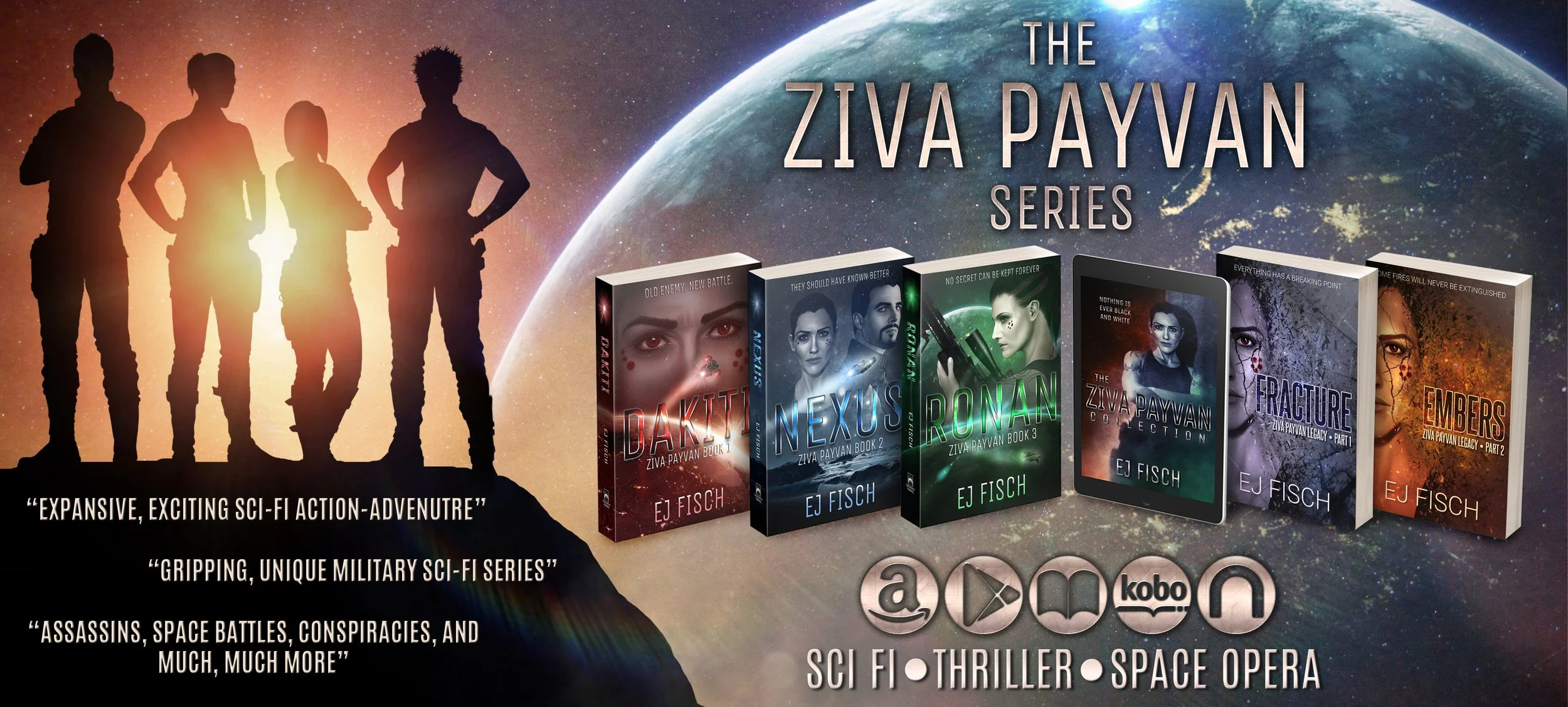Author Interview: EJ Fisch
1. Hi tell us a bit about yourself and what inspired you to write?
Hello! I’m EJ Fisch, author, artist, gamer, and general nerd. I’ve liked telling stories for just about as long as I can remember. Creative writing projects were some of my favorite activities during school. I got more serious about writing when I was 13 or 14—a couple of friends and I had this goofy Star Wars roleplaying game going via IM. We each had our own character and would act out a story, and whenever we’d finish a session, I’d take our chat transcript and “novelize” it. I had a lot of fun doing that, and in hindsight, translating chats to prose was actually a really good starting point for a new writer. I gradually started branching out on my own, creating new worlds and characters.
2. What appeals to you most about the sci-fi genre?
My absolute favorite thing about sci-fi is that there are limitless possibilities. You’re not necessarily constrained by “Earth rules.” You have the option to write heavier sci-fi that’s based more in actual scientific principles. You have the option to create new concepts and technologies that have a scientific basis but ultimately stem from the imagination. Or you have the option to go a more fantastical route and make up whatever you want. Personally, I’m somewhere between those latter two options—my work is more space opera/space fantasy, and I focus more on the story and characters than any scientific concepts. Creating new things from scratch definitely takes a lot of work, but there’s so much FREEDOM.
3. Tell us a little bit about your latest project and the challenges you’ve faced putting it all together?
I’ve been working on my space opera/thriller saga—the Ziva Payvan series—since 2014. In February, I published the fifth book, Embers (2/22/22 was such a fun release date!). Embers is actually part 2 of a duology that I consider kind of a collective sequel to the main trilogy, if that makes sense, but it’s all still one series. Whenever you’re writing a series of any kind, you always have an increasing number of continuity details to keep track of, but Embers was also the culmination of five books’ worth of very complicated character development. One of the biggest challenges was conveying the growth and emotion of the characters while still keeping them in character. But I’m incredibly proud of how it all turned out; I think I did a good job bringing everything together, and readers who have finished the book seem to think so as well!
4. What type of characters do you like to write the most and how much of yourself do you put into them?
One of the reasons Embers’ character growth was kind of tricky to handle is that I like to write very gritty, antihero-type characters. My series namesake character, Ziva Payvan, is an ill-tempered, relentless assassin with a few sociopathic tendencies, but in the end, she’s principled. As she puts it, she’s “not a hero, just a problem solver.” Not all the characters are as dark as she is, though they all have their own share of grit due to the nature of the story and its setting. Ziva’s disposition has made her difficult to wrangle at times (I say, as though I haven’t had complete control over it the whole time), but the journey she goes on throughout the series is pretty amazing. I think I’ve put more of myself in her than I realize; I like to think I don’t have any sociopathic tendencies LOL, but there are some more nuanced aspects of our personalities that are very similar. It’s actually not something I put any special thought into, but I’ve had multiple people read my books and then tell me Ziva reminded them of me. I’ve never quite known whether I should take that as a compliment haha!
5. For any wannabe writers out there what’s the most useful thing you’ve learned?
WRITE. Write everything. Have a random scene in your head of a character doing something? Write it down, even if you don’t know what’s going on. Have ideas for a fictional world but no ideas for a story to take place within it? Write those down anyway. Do what I did and write up a story version of a roleplaying chat (or something similar). Take your favorite scene from a movie or TV show and write it out in prose form (seriously, this is a great exercise). Write, write, write. And don’t ever get rid of anything you’ve written, no matter how terrible you think it is. There’s so much old material I wish I still had, but I deleted it before I knew any better. You never know when you’ll be able to resurrect or recycle an old, random piece of writing. And it’s amazing what an ego boost it can be to look back on old, terrible writing and see how much you’ve improved.
6. What writing tricks do you utilise to hit your deadlines and keep your stories on track?
One of my favorite things about being an indie author is not actually having any true deadlines! My brain doesn’t work very well when I’m on the clock; ideas need to flow at their own speed. My writing process was certainly smoothest as I was writing Ronan, the third book in the Ziva Payvan series, and that was due in large part to the fact that I wrote every single day. Whether it was 1,000 words or 10 words, some form of progress was made daily. If I can keep up momentum like that, I have a much easier time sticking to self-imposed schedules. Unfortunately these days, it’s harder to maintain that momentum when I’m juggling a hundred other responsibilities and hobbies. Last fall, I made up my mind that I was going to complete the Embers draft by the end of November in lieu of actually participating in NaNoWriMo. I was able to slide back into my daily writing routine for the duration of the month and got the draft done with a couple of days to spare. So mental discipline and writing every day definitely seem to be key—those things just don’t always happen.
7. Are you a plotter or a pantser (make it up as you go)?
I have given pantsing my best shot and failed miserably. I should have known better—I’m the type of person who makes grocery lists in the order in which I know I’ll find the items around the store, so why on earth would I think I could write a book without a plan? So now I plot automatically. I usually start with some sort of high-level list of scenes/events I know need to take place in the story, and then I develop a more thorough outline, adding details as I go.
8. What plans do you have for the future? A new series or perhaps a dip into other genres?
All the projects I’ve got on my to-do list will take place within the same universe as my current series, which is, for all intents and purposes, over. I figure I’ve already created all these worlds and alien races and their technology and politics, so why not make the most of it? I’ve got a couple of ideas for standalone stories starring new characters, with a few tie-ins to familiar material; one of these will have a little more of a post-apocalyptic twist, rather than space opera. I’d also like to delve a little more into some of the secondary characters from the series. We’ll definitely see more of Ziva too.
9. With the world the way it is at the moment what sort of tales do you prefer? Ones with heroes where good triumphs over evil or ones that take a darker approach?
You know, I’m not sure if I have any preference! I’ve always been kind of a sucker for grittier/bleaker stories with bittersweet endings, but sometimes a classic good-triumphs-over-evil setup is such a refreshing escape.
10. What’s better, Harry Potter, Lord of the Rings or Star Wars?
I’ve got to go with Star Wars, simply because it has provided so much inspiration for me over the years and is essentially what got me started writing.
Follow E.J on social media -


